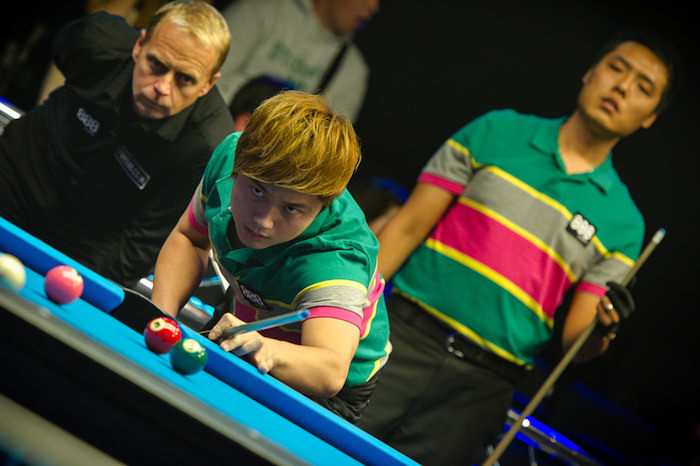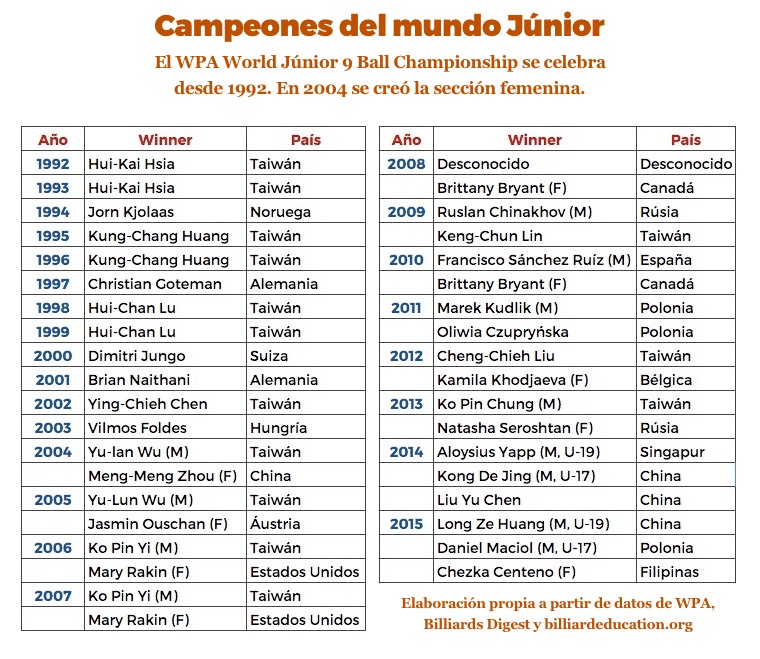Since the competition was established in 1992, 38 young players have been proclaimed world Junior Pool champions. Winning this prestigious 9-Ball tournament and winning the title backed by the World Pool-Billiard Association is a big leap for those billiard players who dream of being professionals of this sport. It is a great showcase for visibility and sponsors, and a good indicator of the future of the Pool. In this post we look at which countries dominate the ranking, which players have been junior world champions and their evolution since then.

In Taiwan there has been and there is much young talent for billiards. Just look at the champions chart to realize that something good is going on in the Republic of China. 14 out of the 38 junior champions correspond to that country. That is almost 37%. The last Taiwanese who took the title was Ko Pin Chung in 2013. His brother, Ko Pin Yi, had already won twice: 2006 and 2007. We are now talking about two of the best players in the world, who are still very young but are already enshrined. Ko Pin Yi especially with a spectacular hat-trick this year: World 10 Ball, 9 Ball and World Cup of Pool World.

What about young Americans and Filipinos? If Taiwan stands to get most of the titles, the United States and the Philippines, two powers in Pool that are distinguished by failing in World Championships for young players. No male players in these countries has ever achieved the gold medal, only two female players have done it: Mary Rakin (USA) in 2006 and 2007 and Chezka Centeno (PHIL) last year. This does not mean that the Pool is dead in both countries, but it shows that something is wrong in these regions with respect to new players: sometimes it is not lack of young talent but they do not take advantage of those who do exist.
Winning the junior world does not guarantee anything but it can open many doors. Sometimes it means taking the jump to the professional pool, which means starting your career and start living off Pool. This is what happened to Ruslan Chinakhov when he became champion in 2009, with 17 years old. That same year he reached the quarterfinals in the World 10 Ball in Manila and the next season he reached the semifinals in the World Cup Ball 8. Six years later, Ruslan is in an important position within the professional Pool. Without going any further, this year he has again proclaimed champion of the Kremlin Cup and has defeated Shane Van Boening in the Challenge of 30 games won.
In 2010 the great Francisco Sanchez Ruiz showed his enormous talent and proclaimed Junior world champion in the United States. He thus became the first and so far the only Spanish to get it. The Spaniard went on like a steamroller over the defending champion, Ruslan Chinakhov, defeating him 9-1 in the semifinals. In the final he won to American Jesse Engel 11-6. Those who by that time had already been dazzled with the game of "Ferrari" in national tournaments, knew what he was capable of. But even if you play great and you have an innate talent, winning the world title is very complicated.
If you look at the junior female champions, the medals are much more divided: players from China, Austria, United States, Poland, Canada and Belgium. The American Mary Rakin won the championship two consecutive years, but the Austrian Jasmine Ouschan, who won the title in 2005, is one of the most professionalized players today. It’s also convenient to keep track of the Belgian Kamila Khodjaeva, who won in 2012.
Take note of these names: Aloysius Yapp, Kong De Jing, Liu Yu Chen, Long Ze Huang, Daniel Maciol and Chezka Centeno. They are the junior champions in 2014 and 2015. Some will have everyone talking and I would not be surprised if Aloysius Yapp becomes another Ko Pin Yi in three or four years.







